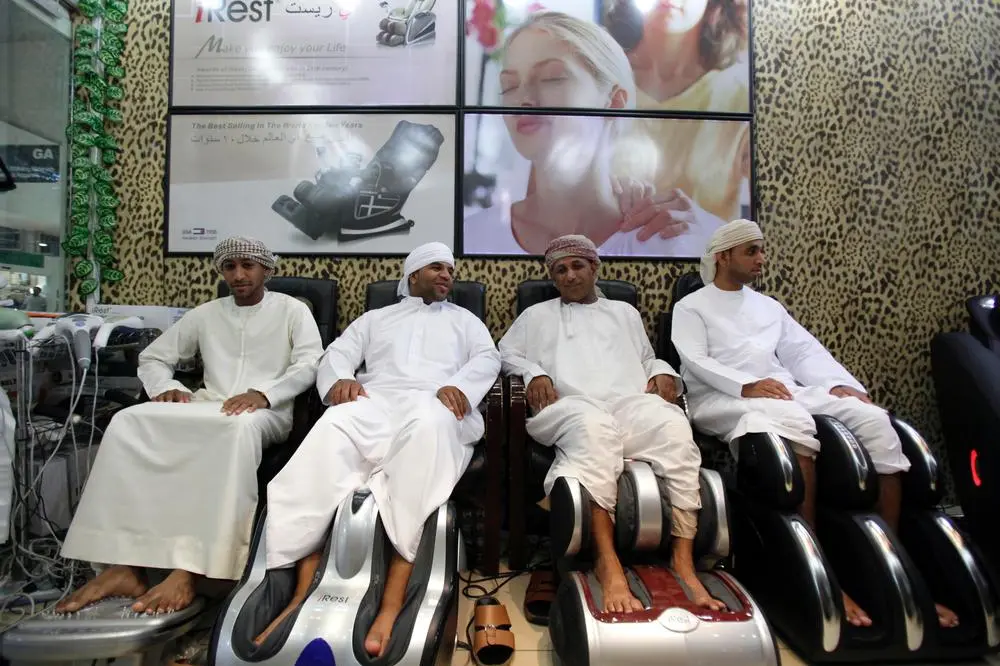PHOTO
The UAE has steadily cemented its position as the destination of choice for medical tourists due to its wide range of state-of-the-art technology, affordable treatments and highly specialised doctors.
Experts across the country's medical sector are optimistic about the UAE's progress in becoming the world's top destination for quality healthcare in the coming years, especially as the government increases its spending in the sector. The global medical tourism market is reported to be currently around $100 billion and is growing at a rapid rate of approximately 20 per cent year on year.
The UAE and Oman are expected to record the highest growth rates in healthcare spending between 2017 and 2022 at 9.6 per cent and 9.1 per cent, respectively, according to Alpen Capital. As a result, the UAE has already witnessed a sizeable increase in medical tourists who are drawn to the country for treatments ranging from major surgeries to rehabilitation and cosmetic corrections.
"The growth of the UAE's medical tourism industry has been exceptional, transforming the country into a medical tourism hub of the region. The country has been focusing on increasing its healthcare infrastructure in terms of quality as well as quantity, in line with its global aspirations for medical tourism," said Dr Thumbay Moideen, founder and president of Thumbay Group.
The Medical Tourism Index, a tool that ranks countries and cities based on their attractiveness as a medical tourism destination, in 2016 indicated that Dubai and Abu Dhabi were respectively ranked as the 16th and 25th best global destinations for medical tourism.
According to the Dubai Health Authority, medical tourism generated more than $381 million for the emirate in 2016. The city received 326,649 medical tourists, representing an increase of 9.5 per cent over the previous year. The most popular treatments were orthopaedics, dermatology and ophthalmology. In 2016, the largest medical tourists came from Asian countries, accounting for 37 per cent of visitors. Arab and GCC countries were the second largest market, accounting for 31 per cent of tourists. Visitors from Europe amounted to 15 per cent of the total.
"The UAE's rise to the top 20 list of popular medical tourism destinations worldwide is proof of our rapidly increasing medical tourist numbers," noted Moideen. "The government's keenness to make the UAE among the top five global medical tourism destinations and the aggressive efforts in this direction will definitely drive more medical tourists to the country. Some shining examples in this direction are the launch of the Dubai government's 'Dubai Health Experience (DXH)' and investor friendly initiatives like the Dubai Healthcare City."
Dr Howard Podolski, CEO of Cambridge Medical Centre and Rehabilitation, said that the UAE is the perfect destination for people who are looking for highly specialised medical care.
"The country has developed a highly advanced infrastructure of specialty healthcare service providers, offering a range of specialty facilities such as orthopedic, long-term care and rehabilitation. For example, the Cambridge Medical and Rehabilitation Centre attracts patients from across the region who are looking for state-of-the-art rehabilitation and long-term care. A robust healthcare infrastructure, premier medical experts from around the world, and affordable treatment, are some of the major reasons why people prefer to come to the UAE for treatment," he said.
Podolski also added that while the UAE has already made its mark as a strong international hub for medical tourism, the future seems more promising. "The announcement of the 10-year visa for highly specialised professionals, such as doctors and researchers, will encourage the best talent to come to the UAE, thus having a huge impact on medical tourism. A visionary, proactive government coupled with a highly advanced infrastructure will make the UAE one of the top healthcare destinations in the world."
Experts further noted that the UAE has always been a force to be reckoned with when it comes to promotion, infrastructure, and logistics. These three forces are key to create supply-induced demand for industries such as medical tourism.
Concerted efforts lead by government organisations such as the Department of Health, and Department of Culture and Tourism in Abu Dhabi and the Federal Ministry of Health and Prevention will play a pivotal role in supporting growth, says Dr Mishal Al Kasimi, CEO of Capital Health.
"With the recent signing of a strategic partnership with a massive country such as China. Chinese tourists who have increased by 120 per cent in the last five years will likely start looking at the UAE as an attractive medical tourism destination if providers and investors alike adjust their products and services to serve them; Thailand alone saw nine million Chinese medical tourists in 2016, and there is no reason why they would not diver their attention to the UAE," he said.
The usual draw for medical tourists, he explained, is value for money spent. While Asian destinations such as India and Thailand provide procedures such as knee replacements, spinal fusion or heart bypass for a tenth of the price when compared with the US - $15,000 for heart bypass surgery in Thailand versus $123,000 in the US - the language and communication barrier as well as below par infrastructure and hotel/retail offering when compared with the UAE can play a big role in dissuading patients from going there and choosing the UAE instead.
"It is a matter of positioning after all; the UAE will definitely be able to position itself a mid market player with superior services," Al Kasimi said.
"The UAE would benefit from promoting the country as one medical tourism destination, perhaps with a focus on aesthetics and more complex specialty procedures such as heart bypass, heart valve replacement, comprehensive medical rehabilitation and oncology."
- rohma@khaleejtimes.com
Copyright © 2018 Khaleej Times. All Rights Reserved. Provided by SyndiGate Media Inc. (Syndigate.info).





















